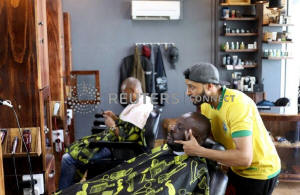|
Whisky with your wax? South Africa rides
'metrosexual' wave
 Send a link to a friend
Send a link to a friend
 [January 12, 2019]
By Sisipho Skweyiya [January 12, 2019]
By Sisipho Skweyiya
JOHANNESBURG (Reuters) - Before male beauty
parlors began popping up in South Africa a few years ago,
image-conscious men like Gerhard Joubert felt awkward being pampered and
preened in salons filled with women.
"It's a male environment. They give you a whisky if you want a whisky.
In the old days we had to go to female hair salons," said Joubert,
reclining in a luxury leather chair for a pedicure in Sorbet Man, a
men-only parlor in Johannesburg.
"I think we need to look better after ourselves. I think it's often been
ignored, particular in South Africa."
Two decades ago, well-groomed celebrities such as David Beckham began to
change traditional attitudes towards masculinity, encouraging swathes of
men to take greater care of their appearance and embrace the use of
beauty products.

South Africa has been slow to catch the "metrosexual" wave, but a
growing middle class and the spread of fashion trends on social media
has seen global companies such as Unilever, Procter & Gamble and L'Oreal
target more products at African men.
Salon chains are opening men-only parlors to sell these products and to
meet the demand for everything from manicures to eyebrow threading.
Sorbet Man was launched as a spinoff from a women's salon brand three
years ago and now has 20 franchise stores. It expects turnover to rise
50 percent this year.
[to top of second column]
|

FIA worker gestures as he grooms a client at the Bespoken Man, a
full-service gentleman's barber shop in Sandton, South Africa,
December 14, 2018. REUTERS/Siphiwe Sibeko

Rival male beauty shops are springing up.
"I think over the years the stigma about male grooming has really
limited men from basically expressing themselves," said Dexter
Pillay, co-owner of Bespoke Man, a salon in Johannesburg's business
district.
"It's changed now so drastically where men are more metrosexual."
The global male grooming product market is expected to reach $76
billion by 2023 from $58 billion in 2017, according to industry
research.
Africa offers companies the chance to target millions of new
consumers.
"Africa’s youthful population is seen as a market opportunity as
manufacturers look to target the young modern male who is becoming
increasingly conscious about appearance," said Nicola Cooper, a
trend analyst.
(Writing by Joe Brock; Editing by Alison Williams)
[© 2019 Thomson Reuters. All rights
reserved.]
Copyright 2019 Reuters. All rights reserved. This material may not be published,
broadcast, rewritten or redistributed.
Thompson Reuters is solely responsible for this content.
 |